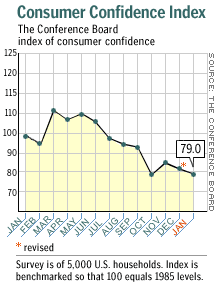NEW YORK (CNN/Money) -
U.S retail sales were sluggish in January, the government said Thursday, dragged down by a drop-off in automobile sales.
The Commerce Department said retail sales fell 0.9 percent to $306.6 billion in January after growing 2 percent in December. Excluding sales of autos and auto parts, however, retail sales rose 1.3 percent after rising 0.2 percent in December.
Economists, on average, expected retail sales to fall 0.6 percent and non-auto sales to rise 0.5 percent, according to Briefing.com.

"Now the question is whether sales can hold up in the face of lower consumer confidence," said Ian Shepherdson, chief U.S. economist at High Frequency Economics Ltd.
Separately, the Labor Department said new weekly claims for unemployment benefits fell to 377,000 in the week ended Feb. 8, compared with a revised 395,000 the prior week. Economists, on average, expected 390,000 new claims, according to Briefing.com.
The reports had little impact on U.S. stock market futures, which were slightly higher, pointing to a positive opening on Wall Street. Treasury bond prices fell.
Wall Street keeps a close eye on consumer spending, which makes up more than two-thirds of U.S. gross domestic product (GDP), the broadest measure of economic activity.
Consumers have spent relentlessly throughout a recession that began in March 2001, the terror attacks of Sept. 11, the corporate malfeasance revelations of 2002 and a three-year bear market in stocks.
The Federal Reserve, by cutting its target for a key short-term interest rate 11 times in 2001 and once again in 2002, has helped encourage that spending by keeping borrowing costs low.
Super-low long-term interest rates, especially mortgage rates, have also helped consumers spend. Low rates have fueled a hot housing market, which has inflated home prices, making homeowners feel wealthier and inspiring a refinancing boom that helped put more money in consumers' pockets.
Automakers have also played a role in propping up consumer spending. Immediately after the Sept. 11 attacks, General Motors (GM: Research, Estimates) started offering zero-percent financing, and other automakers followed suit, giving a boost to sales.
Auto sales were strong in December 2002, driven again by such incentives, and a drop-off was expected in January.
The gain in January retail sales, ex-auto, was driven mainly by a 2.7-percent jump in sales at gas stations -- and that was driven by higher oil prices -- and a 2.6-percent jump in sales at food and beverage stores.
Sales fell at other retailers, including furniture stores and electronics and appliance stores.

|

